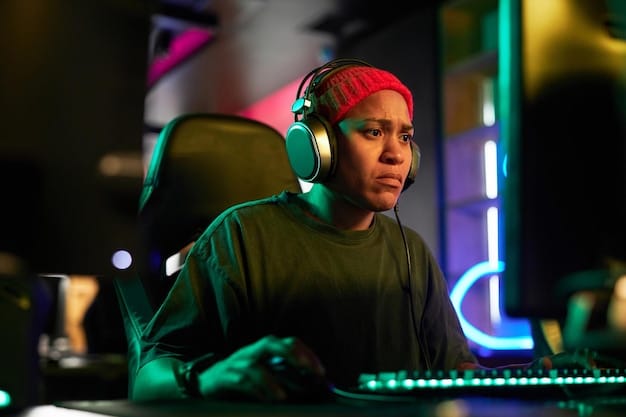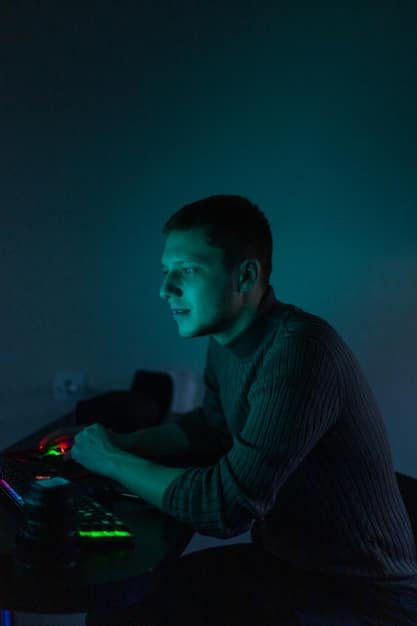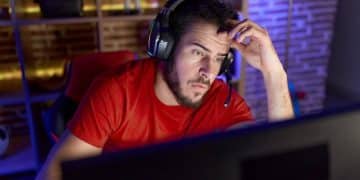Esports and Mental Health: Strategies for US Competitive Gamers

Esports and Mental Health: How to Manage Stress and Anxiety as a Competitive Gamer in the US is crucial for maintaining peak performance and overall well-being. Strategies include mindfulness, time management, and seeking support from mental health professionals.
Esports is a rapidly growing industry, and with it comes increased pressure and competition. For competitive gamers in the US, understanding esports and mental health: how to manage stress and anxiety as a competitive gamer in the US is essential for both performance and well-being. This article explores practical strategies to navigate the mental challenges of competitive gaming, ensuring a healthier and more sustainable esports career.
Understanding the Pressures of Competitive Gaming
Competitive gaming can be incredibly demanding. US-based esports athletes juggle rigorous training schedules, public scrutiny, and the constant pressure to perform at their best. Understanding these pressures is the first step in effectively managing stress and anxiety.
The Impact of Competition on Mental Health
The drive to win can take a toll. Professional gamers often face intense pressure from sponsors, coaches, and fans, leading to performance anxiety, burnout, and other mental health issues. Recognizing these risks is vital for proactive management.
Common Stressors for US Esports Athletes
Several factors contribute to stress in competitive gaming. These include long hours of practice, travel schedules, social media pressures, and the financial instability that can come with a career in esports. Each of these stressors can compound, impacting mental well-being.
- Performance anxiety during crucial matches
- Burnout from overtraining and lack of rest
- Social isolation due to demanding schedules
- Financial insecurity, especially for aspiring professionals
By acknowledging these stressors, esports athletes can begin to develop strategies for coping and maintaining a healthy mindset. This awareness forms the foundation for addressing mental health challenges effectively.
Strategies for Managing Stress and Anxiety in Esports
Effective stress management is crucial for sustained success in esports. US competitive gamers can adopt various techniques to mitigate anxiety and maintain a positive mental state, enhancing both their performance and overall well-being.

Mindfulness and Meditation Techniques
Mindfulness practices, such as meditation and deep breathing exercises, can help gamers stay present and focused, reducing the impact of anxiety and improving concentration. These techniques can be easily integrated into daily routines.
Time Management and Prioritization
Balancing practice, rest, and personal life is essential for preventing burnout. Effective time management involves setting realistic goals, prioritizing tasks, and scheduling regular breaks. Tools and apps can assist in organizing time efficiently.
Techniques such as the Pomodoro method can be highly effective in structuring practice sessions. By dividing their time into focused intervals with short breaks, players can maintain their concentration and avoid mental fatigue.
- Setting realistic daily and weekly goals
- Using scheduling tools to manage time effectively
- Prioritizing tasks based on importance and urgency
- Including time for relaxation and social activities
Implementing strong time management skills can allow competitive gamers to preserve their physical and mental energy, helping them achieve more sustained personal and professional accomplishments.
The Importance of Physical Well-being for Mental Health
Physical health plays a significant role in mental well-being for esports athletes. US competitive gamers need to prioritize exercise, nutrition, and sleep to support their cognitive function and emotional stability.
Exercise and Physical Activity
Regular physical activity can reduce anxiety, improve mood, and boost cognitive function. Activities as simple as walking, jogging, or cycling can make a significant difference. It’s important to find an activity that is enjoyable and sustainable.
Nutrition and Diet for Optimal Performance
A balanced diet rich in vitamins, minerals, and antioxidants supports brain health and overall well-being. Avoiding processed foods, sugary drinks, and excessive caffeine can help stabilize mood and energy levels. Staying hydrated is also crucial.

The Role of Sleep in Recovery and Mental Clarity
Adequate sleep is essential for recovery and optimal cognitive function. US esports athletes should aim for 7-9 hours of quality sleep each night. Creating a consistent sleep schedule and optimizing sleep environment can improve sleep quality.
Strategies that can enhance sleep include:
- Keeping a consistent sleep schedule
- Establishing a restful bedtime routine
- Creating a quiet, dark, and cool sleep environment
- Avoiding screen time before bed
Prioritizing physical well-being through exercise, nutrition, and sleep enhances mental resilience, leading to better performance and reduced stress in the demanding world of esports.
Building a Support System
Having a strong support system can significantly impact an esports athlete’s mental health. US competitive gamers should cultivate relationships with coaches, teammates, friends, and family to provide emotional support and guidance.
The Role of Coaches and Mentors
Coaches and mentors can offer valuable insights and support, helping athletes navigate the challenges of competitive gaming. They can provide feedback, encouragement, and guidance on both gameplay and mental well-being.
Teammate and Peer Support
Peers can provide a sense of community and understanding. US esports athletes should foster supportive relationships with their teammates, creating an environment where they can share their experiences and challenges. Group discussions and team-building activities can foster a sense of camaraderie.
Seeking Professional Help
When stress and anxiety become overwhelming, seeking professional help is crucial. Mental health professionals can provide therapy, counseling, and other interventions to help athletes manage their mental health. Cognitive behavioral therapy (CBT) is particularly effective for addressing anxiety and stress.
Access resources like:
- Therapists specializing in sports psychology
- Counselors with experience working with athletes
- Support groups for esports professionals
By building a robust support system, US competitive gamers can effectively navigate the psychological difficulties of their vocation, promoting a secure and balanced strategy for long-term expansion and well-being.
Creating a Healthy Gaming Environment
The environment in which US competitive gamers train and compete can significantly impact their mental health. Creating a positive and supportive atmosphere is essential for reducing stress and promoting well-being.
Promoting Positive Communication and Team Dynamics
Encouraging open and honest communication within teams can help resolve conflicts and create a more supportive environment. Establishing clear expectations and ground rules for communication can prevent misunderstandings and foster mutual respect.
Setting Boundaries and Avoiding Toxic Behavior
It’s crucial to set boundaries to protect mental health. This includes limiting exposure to toxic online environments, avoiding negative interactions, and prioritizing personal well-being over competitive pressure. Gamers can also use tools and filters to block abusive content.
Encouraging a Balanced Lifestyle
Promoting a balanced lifestyle is key. This includes encouraging US esports athletes to pursue outside interests, spend time with friends and family, and engage in activities that promote relaxation and enjoyment. A well-rounded life can help prevent burnout and maintain a healthy perspective.
Considerations when constructing a game plan include:
- Integrating relaxation techniques into daily practice and competition schedules
- Participating in community events, volunteer activities, and hobbies beyond video games.
- Establishing social media boundaries.
Promoting healthy gaming environments encourages a culture that prioritizes psychological well-being, which in turn promotes more robust overall performance for US esports athletes.
| Key Aspect | Brief Description |
|---|---|
| 🧠 Mental Strategies | Mindfulness, time management, and professional help. |
| 💪 Physical Health | Exercise, balanced diet, and sufficient sleep. |
| 🤝 Support System | Coaches, peers, and mental health professionals. |
| 🎮 Healthy Environment | Positive communication, boundaries, and balance. |
Frequently Asked Questions
Stress impairs focus, reaction time, and decision-making, significantly affecting esports performance. US competitive gamers must manage stress to maintain peak abilities, therefore understanding esports and mental health: how to manage stress and anxiety as a competitive gamer in the US is crucial.
Quick stress-relief techniques include deep breathing exercises, brief meditation, and taking short breaks to stretch or walk around. These methods help reset focus and reduce tension during intense gaming sessions.
Yes, professional therapy, particularly cognitive behavioral therapy (CBT), can effectively manage esports-related anxiety. It provides tools to reframe negative thoughts and develop healthy coping mechanisms, enhancing mental resilience
Sleep is crucial for competitive gamers as it affects cognitive functions like memory, reaction time, and decision-making. Adequate sleep improves performance, reduces stress, and supports overall mental well-being, essential for Esports and Mental Health: How to Manage Stress and Anxiety as a Competitive Gamer in the US.
Coaches play a significant role in mental wellness by providing support, guidance, and encouragement. They can help athletes manage stress, set realistic goals, and cultivate a positive mindset, contributing to both performance and personal growth.
Conclusion
In conclusion, managing **esports and mental health: how to manage stress and anxiety as a competitive gamer in the US** is vital for sustained success and overall well-being. By integrating mindfulness, physical health practices, and strong support systems, US competitive gamers can maintain peak performance.



![Mastering [your chosen topic] in PC Gaming: A Deep Dive Mastering [your chosen topic] in PC Gaming: A Deep Dive - Cover Image](https://arcanenews.com/wp-content/uploads/2025/07/arcanenews.com_11_1753889991_8be9b385_cover-360x180.jpg)

